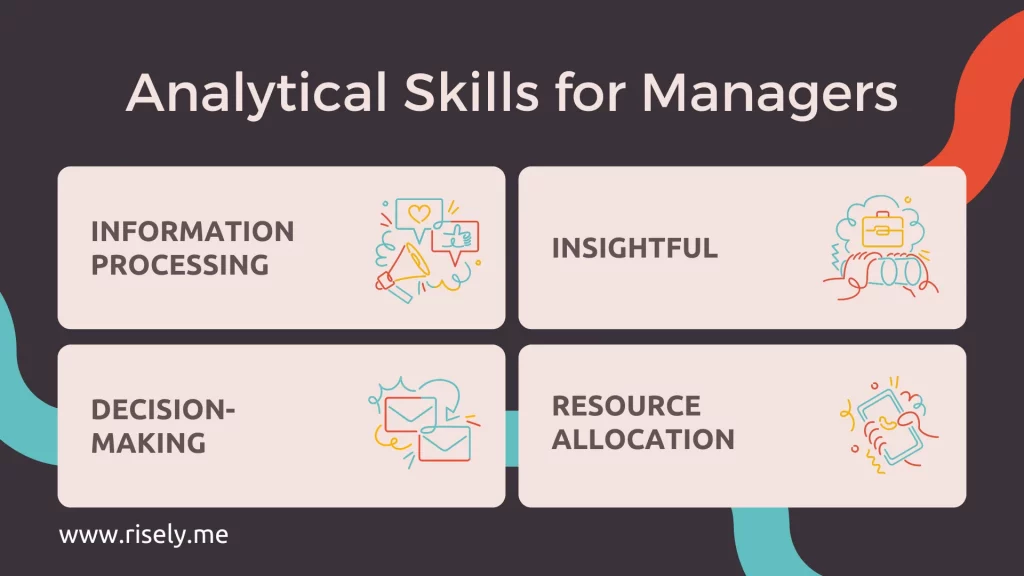How To Improve Analytical Skills As A Manager?
Managers are instrumental for any organization. Their best feature is their numerous skills that add rationality and balance to countless decisions. But, at times, even managers can face trouble. Their own biases and heuristics can hamper their analysis. This creates difficult situations for any team. Hence, it is essential for managers to hone their analytical skills to avoid this. The need for accurate analysis in the managerial role is at an all-time high. Analytical Skills don’t come easy for everyone, but by having them, one can make many improvements in the performance of any team. This blog post will enlighten you on various reasons managers should have analytical skills. Further, it will unfold the core ingredients of managers’ excellent analytical skills and tips on how to develop them. But before that, let us understand the very meaning of analytical skills thoroughly.What are Analytical Skills?
Analytical skills refer to the ability to comprehend disparate sets of information and draw valuable insights from them to make decisions and solve problems. Analytical skills can include a wide range of professional qualities, including critical thinking, data analysis, decision-making under pressure, solving complex problems efficiently, and creativity. Contrary to popular perception, “analytical skills” are not merely about huge numbers but are a core element in the evaluation of qualitative situations too. In the context of managers, analytical skills stand for the ability to analyze and then make decisions related to business strategy clearly and logically. There is no universal list of analytical skills that a manager must have. The key here is to understand that we are referring to the important process that needs to occur before a decision is made for it to be logically sound. People can use the term for the ability to evaluate data and contexts, understand the repercussions of a particular outcome, or find a unique way to get out of a tricky situation. Apart from analytical skills, the other key areas of manager effectiveness are:Why do Managers need Analytical Skills?
Decision-making is key to management. As a manager, you will often find yourself at the head of the table, charged with making decisions that will impact the whole team. You need to have sound analytical skills if you want to make the best choice possible for your team.Making informed decisions
A manager with good analytical skills can take into account all the needs and expectations before deciding on something for the team. They can make rational decisions that are powered by insights drawn from relevant data drawn by the team. Through their ability to analyze logically to make informed decisions, they can visualize the effects those decisions will have. Moreover, managers are less likely to fall prey to biases and heuristics when they are armed with sound analytical ability. Their decisions are sure to turn out well-formed and based on sound reasoning.Spotting trends that help in decision making
A person with great analytical skills is known for their ability to derive insights out of the clutter. Therefore, a manager armed with analytical skills will be able to identify upcoming changes. They might be able to foresee the direction in which the team is going. In case they spot danger, they can put appropriate safeguards accordingly. Similarly, after understanding the big picture for their team, they will be able to make decisions and interventions that will help them succeed. Such a manager can also spot the hurdles that are preventing the team from being productive.Other Interesting Reads
Understanding the needs of the employees
Analytical skills will help a manager gain insights about their employees as well. This will help them immensely in doing their job as a manager as they will have an in-depth understanding of their employees. Consequently, their approach toward the people can be more flexible and curated to their needs. Further, analytical skills will be an indispensable tool during conflict resolution. In such a scenario, the manager will be able to efficiently analyze both situations and then arrive at a decision that benefits one and all. A great understanding of the organization’s culture and dynamics will be helpful in their role.Improving efficiency and enabling innovation
Analytical skills help managers to adapt to changes in the business environment. They can find ways to improve their efficiency and performance by figuring out new ways of doing things. Creativity combined with understanding can develop great ways of doing work which can help the team overcome the challenges they faced hitherto. Further, analytical skills allow managers to adopt optimum and efficient utilization of time and other resources of the team. It helps managers understand the pros and cons of various methods, which helps them in making sound choices. All in all, they can organize and handle tasks systematically, helping the team reach new heights. Overall, Analytical skills are one of the key skills of the skill set required by managers to be effective in their role. Let’s now unravel the four facets of analytical skills for managersThe 4 core ingredients of Analytical Skills for managers

Information Processing
Information processing as a manager is all about using the available information and incorporating insights into the decision-making process. Managers have to take raw information and use it to generate ideas for the next steps that their team can take. For instance, a manager might get data on employee experience from a survey that was conducted on their team. They can analyze this data to understand the problems that their team is facing. Suppose a number of candidates rate their satisfaction from work mode in the team towards the lower end of the scale. This is a part of the data that the manager has to use to generate efficiency. Managers who are good at information processing:- Ensure that their team has all the relevant information to accomplish the assigned task
- Help the team break down the bigger goal into smaller achievable tasks
- Give clear instructions about whom to seek help and when
- Take care of the paperwork, ensuring accuracy, completeness, and timeliness
Being Insightful
This refers to managers being able to draw valuable insights from the processed information. It means that they can take all information (data, interpretations of the data, and intentions) into account in their decision-making processes. It involves applying critical thinking when analyzing results of information processing to draw conclusions or insights that can prove to be useful for the business. From our earlier example, the manager who saw employees rating work mode badly might be able to conclude that a significant portion of the workforce is unhappy with it. This means that an intervention is needed. The manager’s next step will be to figure out how it can be made. Being Insightful involves- Drawing a valuable inference from available information
- Being able to connect the dots despite missing pieces of information
- Making effective decisions keeping the team, stakeholders, and the company in mind
Resource Allocation
Resource allocation refers to the process managers use to allocate resources within their teams. It is the process of assigning and distributing resources to meet the needs of different parts of an organization. As some of these resources are shared and allocated among different parts of the organization, managers must allocate them effectively to ensure their best and most productive use. By doing that, they can give their workforce the best possible chances for success and can also find ways to eliminate the waste of resources. Continuing with our earlier example, the manager can organize fortnightly meetups if the team was working remotely and employees expressed unhappiness at that. For this purpose, they will need to allocate some resources from the organization and ask for time from the team itself. As a manager, allocating resources covers:- Dividing the work and resources among team members
- Ensuring optimal usage of resources to meet objectives promptly
- Setting clear expectations about the work norms, timeframes, and rewards
Decision-making
Decision-making is one of the most important tasks a manager or a team leader needs to perform. It is the process of identifying and choosing between different options in making decisions. It involves a series of actions that help managers identify, analyze and select between possible alternatives with defined outcomes. The decision-making process must be powered by analysis to be effective. Therefore, it has to be based on research and relevant insights and made without the influence of bias. Returning to the manager organizing meet-ups, we find them looking for a location! This is because they discussed the proposal with their team, understood their issue, and were able to allocate resources for it – and so the plan turns into tangible action. But what if their best friend on the team spoke against the idea? As a manager with sound analytical skills, they will not be swayed by the opinion of one person whom they view with a favorable bias. Instead, they will look at the bigger picture before deciding. Decision-making as a manager involves:- Basing your decisions on analysis and data
- Developing a systemic review process to remove biases that hurt performance
- Being Transparent
- Explaining your decisions to the team

How to Develop Your Analytical Skills as a Manager?
After understanding the importance and key ingredients of analytical skills, it is also important for managers to know how they can develop these skills. There are 4 simple but effective ways managers can develop analytical skills:Attend educational events and workshops
To have a deeper understanding of analytical skills, workshops and educational events are a great place to start. This will help managers learn more about how it works and how they can add it to their managerial style. Ultimately, It will help them develop better analytical skills by getting good exposure to the concept. You can also check out coaching to get specific help in skill development. Risely can give you a headstart for free with Merlin, your AI coach – start for free today!Get out of your comfort zone
Familiarity often blinds us. When we are in our regular environment, we do not bother to go into details and think through things. You need to break this cycle to develop your analytical skills. Being in new situations or try office icebreakers that will force you to understand the context and think of the results before you decide.Take part in team projects that require using analytical methods
This will allow managers to work with others to solve problems, learn new techniques, and build skills applicable to their career paths. This can have multiple benefits for managers like:- Deepening their analytical skills
- Building partners for future projects and deals
- Developing teamwork skills
- Improving their communication and collaboration abilities
Analyze!
The best way to hone your analytical skills is by using them. In order to do so, you must get into a habit of analyzing day-to-day situations. Analysis has to become a part of your behavior if you want to use it seamlessly. Therefore, you should constantly get into the habit of analyzing things, whether a team problem or a personal one.Conclusion
To conclude, in today’s competitive business world, managers need to be able to rely on their analytical skills to make sound decisions. Overall, these skills are essential to understanding complex data and performing insightful analyses to optimize operations. In this blog post, we have discussed the major reasons why managers should have analytical skills. We have also discussed the four core ingredients of killer analytical skills. Finally, we discussed effective ways by which managers can develop these analytical skills. Overall, we believe that if managers can follow these ways, they can very effectively add these skills to their enormous skill-set.Deeksha, with a solid educational background in human resources, bridges the gap between your goals and you with valuable insights and strategies within leadership development. Her unique perspectives, powered by voracious reading, lead to thoughtful pieces that tie conventional know-how and innovative approaches together to enable success for management professionals.
Enhance your problem-solving skills with the free problem-solving toolkit for managers.
Get the free problem-solving toolkit today to become an efficient manager.
FAQs
What are the characteristics of an analytical leader?
A few signs of an analytical leader are: – Paying attention to details – Understanding the big picture – Planning for the future
How analytical approach leads to success?
An analytical approach leads to success in managerial and leadership roles as it helps the professionals get the bird’s eye view on their team’s present and future. They can plan accordingly with attention to all important factors.
What are the top three analytical skills a manager needs?
Three common analytical skills for managers and leaders are creativity, interpersonal skills, and organizational skills.
What are the essential analytical skills for a manager?
Essential analytical skills for a manager include data analysis, critical thinking, problem-solving, financial analysis, and decision-making. These skills enable managers to make informed decisions, identify problems, develop practical solutions, and understand their organization’s financial health.
Other Related Blogs
Building empathetic managers with Loren Sanders
Building Empathetic Managers with Loren Sanders Empathetic managers are the need of the hour as organizations are undergoing major changes including the introduction of AI into workflows and the threat…
Read this if you think you can run The Bear
Read this if you think you can run The Bear What if your favorite mom-and-pop deli is transformed into something high-end super quick? We are talking of The Bear, Carmy,…
When ‘Cooked’ Doesn’t Mean Dinner: A Manager’s Guide to Gen Z-Speak
When ‘Cooked’ Doesn’t Mean Dinner: A Manager’s Guide to Gen Z-Speak Are you unsure of what your team is talking about? Or yapping about, as they say? It’s not surprising.…
Can your team keep going without you?
Can your team keep going without you? What if you vanished? Alien abduction, probably. The method isn’t the matter here; it’s the impact. What if your team wakes up one…







